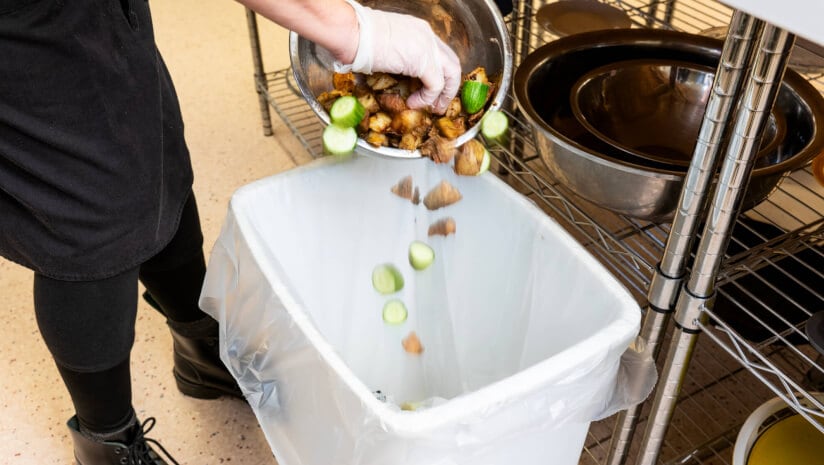In its latest fiscal analysis, the Office for Budget Responsibility (OBR) has changed the description of the packaging waste rules, defining Extended Producer Responsibility (EPR) as tax.
EPR revenues had previously been captured as a fee received and spent within DEL (departmental expenditure limits).
The new treatment of EPR revenues as a tax boosts receipts and decreases DEL fees by an equal and offsetting amount, the treasury spending watchdog added.
The EPR will see producers pay the full net costs of managing and recycling the packaging waste they produce in an effort to increase recycling rates, packaging recyclability and reusability, and reduce excess packaging.
While the policy was announced in 2021, the OBR explained there was previously not enough detail on the fees for this to be reflected as a tax in its receipts forecast.
It estimates it will raise on average £1.6 billion a year between 2025-26 and 2029-30, and cost an additional £2 billion compared to its previous forecast.
“Total RDEL [day-to-day department spending] in 2025-26 is now estimated to be £2.4 billion higher than in the October forecast,” the outlook reads.
“This reflects a £1.5 billion increase to account for the reclassification of revenues from the EPR levy and £0.9 billion worth of additional DEL funding for specific policy measures including tax compliance and the Government’s ‘transformation fund’.”
This reclassification is expected to increase DEL spending by £1.5 billion in 2025-26, and an average of £1.7 billion a year between 2026-27 and 2029-30.
The packaging waste tax came into effect (for some businesses) on April 1 2025 (April Fools) – a date that some in the industry considered fitting.
Drinks sector slams new tax
The Wine and Spirit Trade Association (WSTA) were among those to express their discontent, calling the scheme a joke.
The association argues that the regulation brings in “extortionately high fees for glass” which could see producers switching from recyclable glass to a “more environmentally damaging form of packaging”.
“The flawed scheme is supposed to encourage more recyclable packaging, but DEFRA admits it won’t have an impact on rates of recycling in next five years,” a WTSA statement read, referencing the OBR’s forecast accompanying the Spring Statement.
It added that a packaging waste tax “is not going to improve the UK’s recycling rates” but instead “damage British businesses”.
Commenting, Miles Beale chief executive of the WSTA added: “The Government’s Extended Producer Responsibility fees make the cost of recycling a glass bottle almost 7 times more expensive than for recycling the same sized plastic bottle. With businesses being charged this new “green tax” from today, 1 April, the introduction of EPR could be mistaken as a misjudged attempt by DEFRA at an April fool’s joke. Sadly it is deadly serious. As well as being another Government-inspired cost on businesses in the UK drinks sector, it’s wholly at odds with improving recycling – the aim of the EPR scheme.”
David Gates, CEO of the wine company Laithwaites was also unhappy: “EPR is an inflationary new tax that’s being implemented before it’s properly finished and shares a similar fiendish complexity with the big recent hikes in wine duty.
“Combine them both with the Chancellor’s increase in National Insurance and our family wine business is left facing an extra £10m in taxes year on year – a body blow that leaves us with little choice but to put up prices, look hard at the size of our workforce, postpone or cancel CAPEX projects and consider prioritising our other markets for investment.”
Steve Perez, the founder and chairman of Global Brands Limited which owns brands such as Hooch and VK, agreed, posting on X: “I wish it was a joke unfortunately this will be the final nail in coffin for some drinks and hospitality businesses and will most certainly lead to job losses.”
‘Not a tax to plug shortfalls’
But the Food and Drink Federation (FDF) disagrees.
Commenting, Jim Bligh, director of corporate affairs, communications and packaging, FDF, said: “Food and drink manufacturers support EPR because, if implemented properly, it could help the UK develop a world-class recycling system and a circular economy for packaging, which is something we want and need.
“To do this, government must ringfence the billions of pounds raised through EPR fees to be spent on improving recycling rates. Let’s be clear – this money is a levy for investment in recycling, not a tax to plug shortfalls in council budgets. Government must use these fees to turbocharge investment in the UK’s recycling infrastructure.
“It also must be used to support local authorities to improve their recycling performance, so costs don’t creep up in coming years. Businesses and consumers will be paying for EPR, so deserve to see real change in the recycling system, rather than the flatlining rates we currently have. Handing control of the scheme over to producers will help to ensure processed materials come back into the system, so we can turn a crisp packet or a yoghurt pot back into food packaging, creating a truly circular economy.”
Obligations remain the same
Speaking to Veronica Webster Celda associate director, UK from Osborne Clarke on the news, she told Food Manufacture: “Whilst the government has now confirmed that the EPR will be treated as a tax, this change does not impact or change businesses obligations under the EPR regulations. Ultimately, for those businesses caught within scope of the scheme, to ensure compliance, they must ensure their July-December 2024 data is submitted ASAP as the deadline was 1 Aprill 2025.
“If a business is identified as non-compliant with EPR, it should take immediate steps to rectify the situation. The Environment Agency is actively working to bring non-compliant producers into compliance with EPR and businesses should cooperate with the regulator to take necessary steps to comply.”





